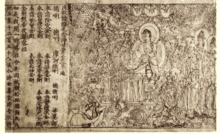
Back কাগজ তৈরি Bengali/Bangla Paperfabrikado Esperanto Fabricación de papel Spanish کاغذسازی Persian कागज निर्माण Hindi Proizvodnja papira Croatian Papírgyártás Hungarian Pembuatan kertas ID ცელულოზა-ქაღალდის მრეწველობა Georgian 제지술 Korean


Papermaking is the manufacture of paper and cardboard, which are used widely for printing, writing, and packaging, among many other purposes. Today almost all paper is made using industrial machinery, while handmade paper survives as a specialized craft and a medium for artistic expression.
In papermaking, a dilute suspension consisting mostly of separate cellulose fibres in water is drained through a sieve-like screen, so that a mat of randomly interwoven fibres is laid down. Water is further removed from this sheet by pressing, sometimes aided by suction or vacuum, or heating. Once dry, a generally flat, uniform and strong sheet of paper is achieved.
Before the invention and current widespread adoption of automated machinery, all paper was made by hand, formed or laid one sheet at a time by specialized laborers. Even today those who make paper by hand use tools and technologies quite similar to those existing hundreds of years ago, as originally developed in China and other regions of Asia, or those further modified in Europe. Handmade paper is still appreciated for its distinctive uniqueness and the skilled craft involved in making each sheet, in contrast with the higher degree of uniformity and perfection at lower prices achieved among industrial products.